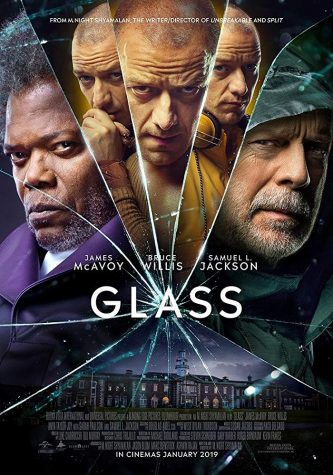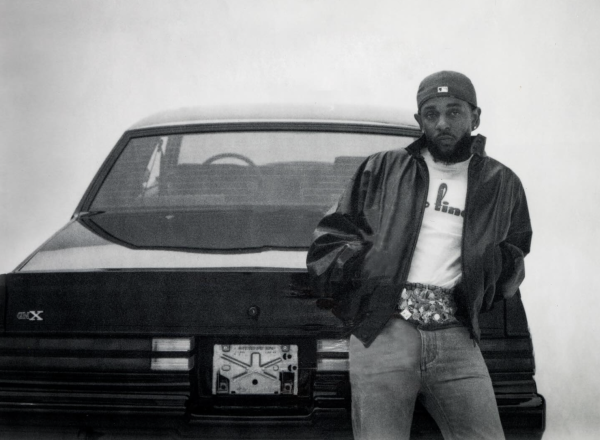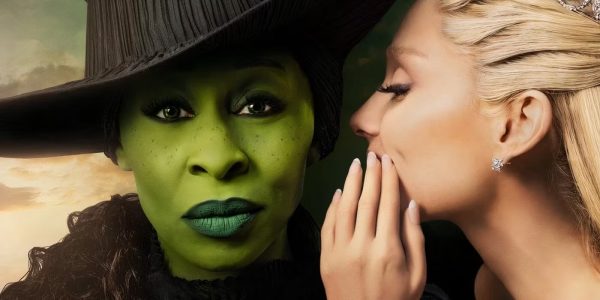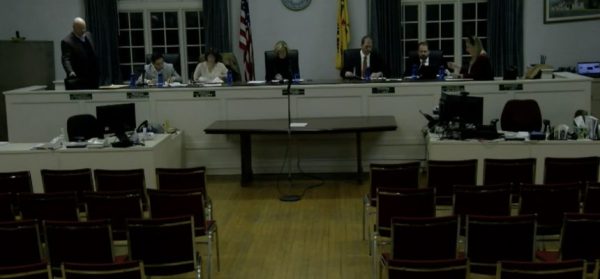On the topic of ‘Glass’
M Night. Shyamalan has done something. Good? Bad? Honestly, I can’t tell. Which is why I’m writing this. Recently, I viewed the film “Glass,” the conclusion of a trilogy of movies 19 years in the making, and it has absolutely stumped me. It is a movie that goes absolutely none of the ways you expect or even want it to go after viewing the trailer. Yet I can’t help but be enamored by it.

Somehow, in its incredibly muted and slow moving story, it proves to be one of Shyamalan’s most ambitious movies to date, which is a hard bar to reach for a director like Shyamalan. The script is sometimes weak, the movie grinds to a halt about 45 minutes in, and Samuel L. Jackson doesn’t have a line for an hour, yet I can’t help but respect it’s ideas and presentation. Which brings us here. I’ve decided I am unable to properly “review” this film. Instead, I am just going to break down why I find it so fascinating and why it’s so ambitious. If you haven’t seen it, go do that, and then come back, as spoilers lie ahead. (And I mean some real spoilers; we’re spoiling the whole thing here.) Strap in, this is gonna be a long one.
For those unaware, “Glass” follows up on characters from Shyamalan’s 2000 film “Unbreakable,” and his 2016 film, “Split.” (Spoilers for Unbreakable and Split) “Unbreakable” follows David Dunn (Bruce Willis), a survivor of a train derailment, who realizes, thanks to a new companion, Elijah Price (Samuel L. Jackson), a man with bones that break incredibly easily, that he may have superhuman strength, only to learn that Elijah caused the train accident in an attempt to create a “real superhero.” “Split” follows Casey (Anya Taylor-Joy), a young girl who is kidnapped with several other classmates by Kevin (James McAvoy), a man with dissociative identity disorder. She soon learns that some of Kevin’s personalities are awaiting the arrival of one known as “the beast”, who manifests superhuman strength and agility when he takes over Kevin’s body. At the end of “Split” it’s revealed that not only does it take place in Philadelphia, but it also exists in the same universe as “Unbreakable”, making a conclusion to the now loose continuity needed.
That’s where “Glass” comes in. “Glass” starts like the climax of an average superhero movie. Very quickly, we are introduced to what David Dunn has been doing for the past 19 years, and also what Kevin has been up to, kidnapping more girls and earning the nickname “The Horde.” David finds Kevin, and the two fight. In any other superhero movie, that’s the end. Our hero and villain find each other, and duke it out until our hero is victorious. Yet this is only the beginning of “Glass”. Instead, the two are discovered by police, and brought into a mental institution, where we meet a new character – Dr. Ellie Staple (Sarah Paulson), a psychiatrist who studies a specific type of delusion where ordinary people begin to believe that they are superheroes. She announces she has three days to convince the two of them, (and Elijah Price, who we learn is being kept there as well) that they are not superhuman, but rather suffering from delusions of grandeur.
Here, any sort of action stops. Where a superhero and supervillain once fought, is replaced by essentially lectures and diatribes that change the very nature of the movie and the trilogy as a whole. Each of our three allegedly superhuman characters is posed with a question: what if you’re not superhuman? And when you first hear it, you scoff at it. “I’m here at a superhero movie, there’s no way there just average people,” I thought to myself. Yet, the lectures continue, and Shyamalan’s true thematic purpose and most ambitious ideas are revealed. He gives solid reasoning to explain away the superhuman actions the trio have exhibited, and a small part of you begins to believe it. Instead of providing the action packed conclusion to a very loose “superhero” trilogy, Shyamalan turns what you were expecting on its head. He holds up a picture of all the superhero movies you’ve seen and asks, “why is this your favorite form of escapism?” and, more to the point of the movie, “why do we ascribe meaning to our trauma?”
It’s this central question that pretty much prompted my writing of this. It is what so many critics hate about it, yet so many others love. Thinking about the sheer amount of guts and ambition to make that the story, it really blows me away. Everyone is expecting a big showdown of a movie, where David Dunn proves Dr. Staple wrong and defeats Elijah and Kevin. Rather, they are treated with M. Night Shyamalan’s breakdown of the superhero genre as a whole.
Now of course it is revealed at the end that they are superhuman after all, but his central question still remains. And it’s an interesting one, especially considering many of the superheroes we worship today. Batman lost his parents, Spiderman lost his Uncle Ben, Superman lost his whole planet. As a society, we love to tell stories where characters make their trauma mean something, and it’s evident in Shyamalan’s trio as well. But Shyamalan asks us if our trauma really does have some grand cosmic meaning, or if we just need an excuse to force ourselves to reach our potential, with superheroes being the extreme example. The idea is essentially, “I lost this, so now I must protect everyone so they do not lose it.” Shyamalan doesn’t necessarily say it’s bad that we do this, but just begs us to be aware that we do.
After this slow second act of treatises and lectures, Shyamalan finally gives us the showdown we wanted. Yet once again, this trope is subverted. We are teased with “Osaka tower” throughout the film, a new building opening up in Philadelphia. After breaking out of his cell, and then breaking out Kevin, Elijah, now going as “Mr. Glass,” tells David that he is going to commit another mass murder at the grand opening of the building, and that he wants Kevin and David to fight there to unveil superhumans to the whole world. But no fight there happens. The rest of the film takes place on the front lawn of the mental institution. Everyone fights for a while, and just like that, it’s over.
And our main characters lose.
In the first of three twists in this movie, Kevin learns that Elijah is responsible for his father’s death, and attacks him, mortally wounding him. Casey, the girl Kevin kidnapped, returns, and convinces him to abandon his “beast” persona. But soon after, he is shot by a SWAT officer with a suspicious clover tattoo on his wrist. Another one of these clover branded officers finally drags David over to a puddle, where Dr. Staple meets him, and explains the next twist. She too, has the clover tattoo, and reveals that she belongs to a secret organization dedicated to putting superhumans in their place in order to maintain the status quo of humanity. As she finishes her speech, David is drowned in the puddle. A man who is supposed to be “Unbreakable” is defeated by a puddle. Shyamalan makes us look at those we’d normally consider our idols and superiors in the blinding light of day, and watch as their hubris with regard to their own power is what dismantles them. However, in one final twist, Dr. Staple learns that Elijah had hijacked every camera, and streamed all of it to all of Philadelphia, revealing to all the reality of superhumans.
By the end, Shyamalan seems to have betrayed his own message. He has presented us with this deconstruction of our obsession with superheroes, yet his deconstruction ends with the death of his new superhumans. But here is the unofficial fourth twist: “Glass” is an origin story for a world we don’t get to see. A few characters even come out and say it. In a brilliant turn, “Glass” is the trauma that future heroes in this world will attribute meaning to, coming full circle as this created world does the same thing we as a society do to our own heroes.
All this is why I consider this one of the most ambitious Hollywood films to be released lately. Any other movie would have made this the satisfying brawl we all wanted to see, yet the story goes into almost every direction except that one, and why I felt the need to talk about it at such lengths. For all it’s failings, and believe me, this movie does have failings (I’m looking at you, script) it still manages to be one of the most fascinating I’ve seen. It is one of the most comprehensive, yet still abstract breakdowns of our obsession with superhero movies. For that reason alone, it’s something wonderful to behold. If you haven’t seen it yet, sorry for the spoilers, but you should still see it anyway. If you have seen it, I hope you take a moment just to consider what this movie means, or just think about what it has to say. It’s fun little thing to ponder. Or write an essay about it, if you’re me.
If you’ve read to this end, I thank you for your patience and attention span. Go reward yourself with a movie or something, I heard “Glass” is pretty interesting.
Sam Rodd is a senior at Pelham Memorial High School and a lover of theater, music and movies. He spends most of his time rehearsing in musicals and plays....












